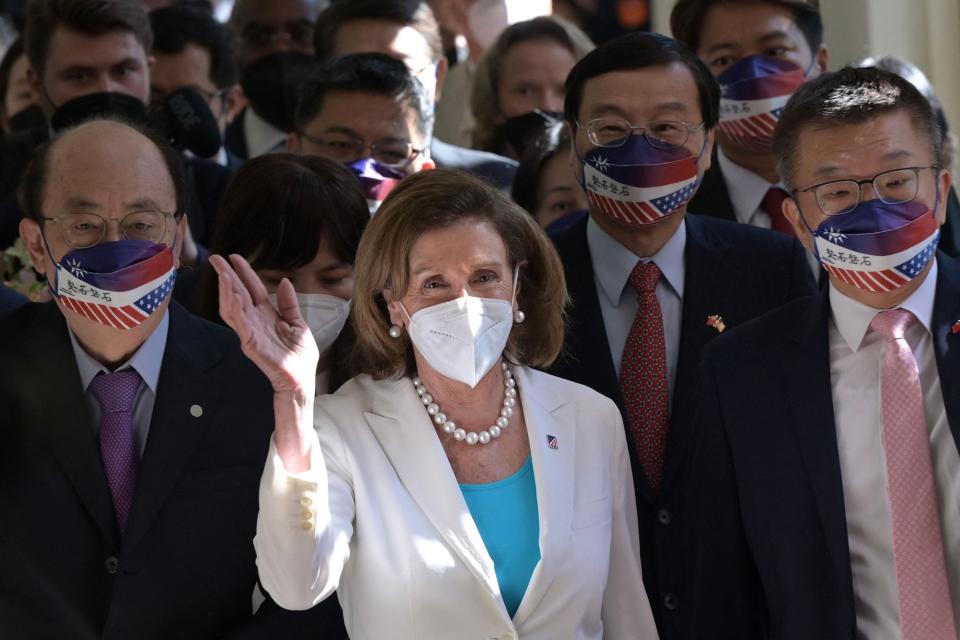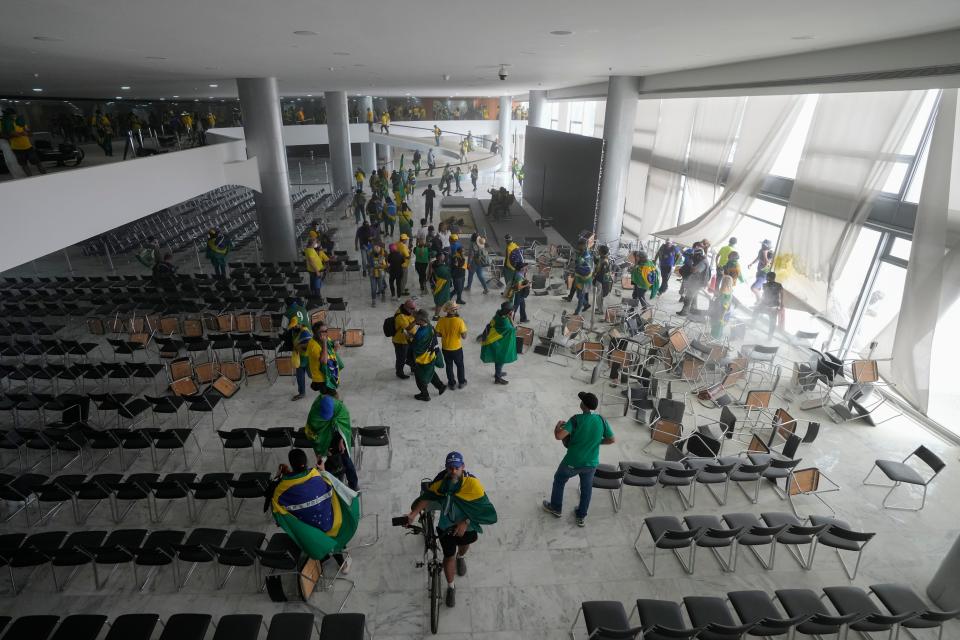Ukraine's fight against Russia. Climate catastrophe. International news to watch in 2023
A year ago, few predicted Russian President Vladimir Putin would launch an all-out invasion of Ukraine (and that Ukraine would successfully repel it). Or that China would – almost overnight, amid rare large-scale protests – rescind its zero-COVID policy. Unexpectedly high food and energy costs pushed up global inflation to 8.8% from 4.7% during the last 12 months, according to the International Monetary Fund.
Predictions, forecasts, future-gazing. These are pursuits that can often be, to use a British phrase, a mug's game. Something only a foolish person, armed with incomplete information, would attempt. At the beginning of this year it seemed unlikely that large-scale protests would erupt in Israel. Or that Wall Street Journal reporter Evan Gershkovich would be detained in Russia and accused of espionage. Still, there are some international story lines that are likely to dominate global headlines in 2023. Here's a selection to watch for.
Ukraine: Will there be a real ceasefire?
There appears to be no end in sight to a war that was started by Russia, has displaced millions of Ukrainians across Europe and led the West to supply ever-more-heavy weapons to Kyiv. "The fighting is likely to be at least as intense in 2023 as it was in 2022," said Daniel DePetris, a fellow at Defense Priorities, a Washington-based think tank. "Putin and Ukrainian President Volodymyr Zelenskyy will talk about their interest in ending the war through a peace settlement, but the two leaders will have vastly different interpretations on what that peace will look like and what it will take to get there."
Russians escaping Putin's war on Ukraine: A new home – and a moral dilemma

Iran's clerical regime in a corner
Nationwide protests about women's rights and a litany of social and economic grievances rocked the Islamic Republic in 2022. Meanwhile, Iran's nuclear capabilities appear to be increasing, it is supplying weapons to Russia for the war in Ukraine and the regime's leaders show no signs of willingness to nurture diplomatic channels to the West. "For the last decade, Iran has been politically and economically stagnant," said Esfandyar Batmanghelidj, a dual American-Iranian who runs Bourse & Bazaar, a think tank focused on Iran's economy. "The country's future is less predictable than it has been in a long time, and this poses a challenge for Western policymakers worried about the threats an increasingly unstable Iran might pose."
'Woman, life, liberty': Iranians on why they'll risk beatings and death for change

Climate: 'It's going to get a lot hotter, and wetter'
United Nations scientists believe there's a 50% chance global temperatures will rise, at least temporarily, to 1.5C above pre-industrial levels between now and 2026. Staying below 1.5C is the long-term goal of the Paris Agreement, an international treaty adopted by a majority of the world's countries in 2015. "The climate story of 2023 is going to be about political backlash," said David Callaway, a former USA TODAY editor-in-chief who runs Callaway Climate Insights, a newsletter that analyzes what the global business community is doing to mitigate climate risks. "In the U.S., Republicans will weaponize financial and political efforts to curtail global warming with hearings, investigations, litigation, and more penalties against Wall Street banks. In Europe, the EU's new carbon border tax will provoke international protectionist threats just as the continent is trying to scramble through the energy crisis caused by Russia. As for the climate, it's going to get a lot hotter, and wetter, with all the social and environmental pain that goes with that."
Climate Point: No, it's not all China's fault, and other climate change myths

Tigray: An uncertain road to peace in Ethiopia
A fragile peace has been established in one of last year's deadliest conflict zones, a civil war in Ethiopia's Tigray region. An estimated 383,000 to 600,000 people died in Tigray between November 2020 and August 2022, according to Professor Jan Nyssen and a team of researchers at Ghent University, in Belgium. "The durability of the peace agreement will partly depend upon whether Ethiopian Prime Minister Abiy Ahmed manages to deal with Eritrean President Isaias Afwerki’s destabilizing efforts in Ethiopia, as well as territorial claims by the Amhara militia to parts of Tigray," said Kjetil Tronvoll, a Norwegian expert on Ethiopia who has studied the region for decades.
The largest war in the world: Hundreds of thousands killed in Ethiopia's Tigray conflict

China vs. Taiwan: Combat or just drills?
China is unlikely to invade the self-governing island of Taiwan that Beijing considers part of its territory, according to analysts at the International Crisis Group, a Belgium-headquartered think tank. But tensions have been rising as China has launched a series of increasingly aggressive war games in the Taiwan Strait and Taipei has bolstered its military defenses. In September, President Joe Biden said U.S forces would defend Taiwan from a Chinese invasion, comments that appeared to go well beyond long-standing stated U.S. policy on Taiwan of "strategic ambiguity" and followed a visit to the island by then-U.S. House Speaker Nancy Pelosi that angered Beijing.
Nancy Pelosi visits Taiwan: U.S. tensions with China escalate
"Breaching Taiwan’s defenses would be a slog and, having seen the West’s response to Russia’s invasion of Ukraine, Beijing likely grasps the international opprobrium and economic cost an offensive could trigger – even if the U.S. opts not to intervene militarily," the International Crisis Group wrote in a recent assessment of the issue.

Threats to democracy: key 2023 votes
There are international elections of consequence every year. Two to keep an eye on in 2023 are in Pakistan and Turkey.
Turkish President Recep Tayyip Erdogan has dominated that country's politics for two decades. "Once a pillar of the Western alliance, the country has embarked on a militaristic foreign policy," Dmitar Bechev wrote in a recent analysis for Carnegie Europe, a foreign policy think tank. "And its democracy, sustained by the aspiration to join the European Union, has given way to one-man rule."
In Pakistan, International Crisis Group analysts note, the country "is entering an election year with a deeply divided body politic, as former Prime Minister Imran Khan whips up populist support against the government and the all-powerful military."
And if threats to global democracy feel remote two years after the Jan. 6, 2021, insurrection on the U.S. Capitol, consider that over the weekend thousands of supporters of former Brazil President Jair Bolsonaro stormed the country's Congress, Supreme Court and presidential palace in an apparent attempt to oust Luiz Inácio Lula da Silva, who defeated Bolsonaro in an October election.
They carried flags, chanted slogans and stormed Congress: In Brazil this time

The list of global conflicts is long and winding
Other stories to watch in 2023:
Israel's military reservists have transformed a political crisis into a security one.
Armenia and Azerbaijan. The South Caucasus nations appear headed toward another confrontation over Nagorno-Karabakh, a disputed region.
China and COVID. What will China's decision to relax its coronavirus restrictions mean for the rest of the world? Amid a surge of cases in China, can we expect more infectious variants?
Saber-rattling from North Korea. The world's most reclusive leader Kim Jong Un is signaling he may be about to test another nuclear weapon.
Haiti is effectively ruled by gangs and its public infrastructure has collapsed.
Six years later, Yemen is still experiencing the world's worst food crisis.
This article originally appeared on USA TODAY: World news in 2023: Major global stories to follow in the new year

